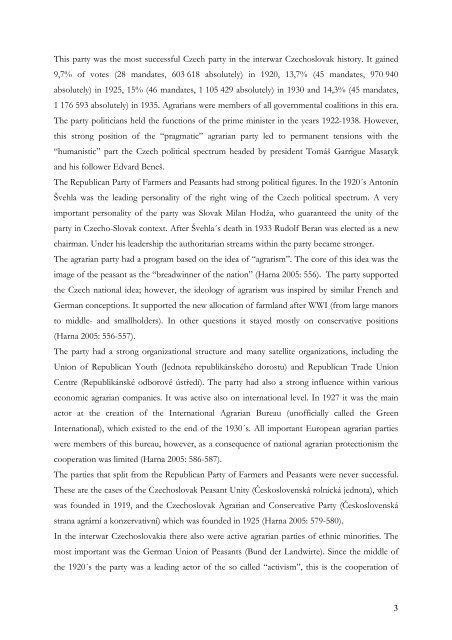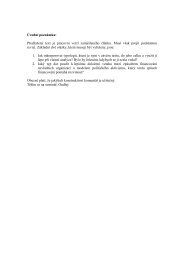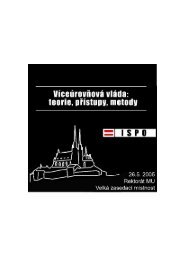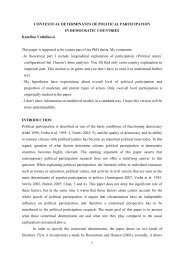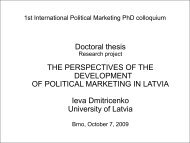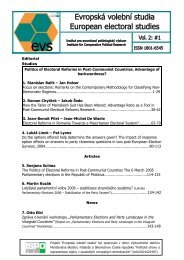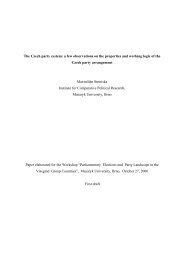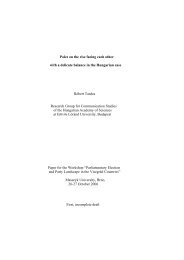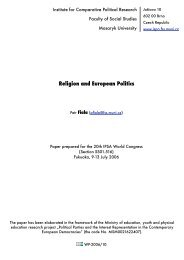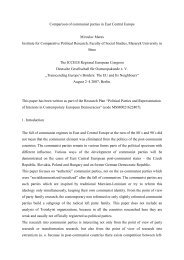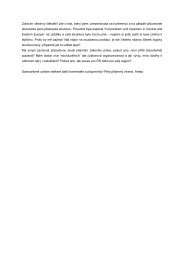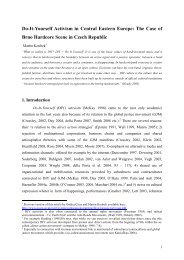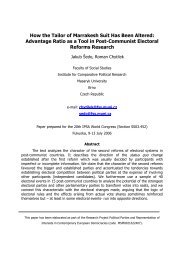Agrarian and Peasant Parties in the Czech Republic - Masarykova ...
Agrarian and Peasant Parties in the Czech Republic - Masarykova ...
Agrarian and Peasant Parties in the Czech Republic - Masarykova ...
Create successful ePaper yourself
Turn your PDF publications into a flip-book with our unique Google optimized e-Paper software.
This party was <strong>the</strong> most successful <strong>Czech</strong> party <strong>in</strong> <strong>the</strong> <strong>in</strong>terwar <strong>Czech</strong>oslovak history. It ga<strong>in</strong>ed<br />
9,7% of votes (28 m<strong>and</strong>ates, 603 618 absolutely) <strong>in</strong> 1920, 13,7% (45 m<strong>and</strong>ates, 970 940<br />
absolutely) <strong>in</strong> 1925, 15% (46 m<strong>and</strong>ates, 1 105 429 absolutely) <strong>in</strong> 1930 <strong>and</strong> 14,3% (45 m<strong>and</strong>ates,<br />
1 176 593 absolutely) <strong>in</strong> 1935. <strong>Agrarian</strong>s were members of all governmental coalitions <strong>in</strong> this era.<br />
The party politicians held <strong>the</strong> functions of <strong>the</strong> prime m<strong>in</strong>ister <strong>in</strong> <strong>the</strong> years 1922-1938. However,<br />
this strong position of <strong>the</strong> “pragmatic” agrarian party led to permanent tensions with <strong>the</strong><br />
“humanistic” part <strong>the</strong> <strong>Czech</strong> political spectrum headed by president Tomáš Garrigue Masaryk<br />
<strong>and</strong> his follower Edvard Beneš.<br />
The <strong>Republic</strong>an Party of Farmers <strong>and</strong> <strong>Peasant</strong>s had strong political figures. In <strong>the</strong> 1920´s Antonín<br />
Švehla was <strong>the</strong> lead<strong>in</strong>g personality of <strong>the</strong> right w<strong>in</strong>g of <strong>the</strong> <strong>Czech</strong> political spectrum. A very<br />
important personality of <strong>the</strong> party was Slovak Milan Hodža, who guaranteed <strong>the</strong> unity of <strong>the</strong><br />
party <strong>in</strong> <strong>Czech</strong>o-Slovak context. After Švehla´s death <strong>in</strong> 1933 Rudolf Beran was elected as a new<br />
chairman. Under his leadership <strong>the</strong> authoritarian streams with<strong>in</strong> <strong>the</strong> party became stronger.<br />
The agrarian party had a program based on <strong>the</strong> idea of “agrarism”. The core of this idea was <strong>the</strong><br />
image of <strong>the</strong> peasant as <strong>the</strong> “breadw<strong>in</strong>ner of <strong>the</strong> nation” (Harna 2005: 556). The party supported<br />
<strong>the</strong> <strong>Czech</strong> national idea; however, <strong>the</strong> ideology of agrarism was <strong>in</strong>spired by similar French <strong>and</strong><br />
German conceptions. It supported <strong>the</strong> new allocation of farml<strong>and</strong> after WWI (from large manors<br />
to middle- <strong>and</strong> smallholders). In o<strong>the</strong>r questions it stayed mostly on conservative positions<br />
(Harna 2005: 556-557).<br />
The party had a strong organizational structure <strong>and</strong> many satellite organizations, <strong>in</strong>clud<strong>in</strong>g <strong>the</strong><br />
Union of <strong>Republic</strong>an Youth (Jednota republikánského dorostu) <strong>and</strong> <strong>Republic</strong>an Trade Union<br />
Centre (Republikánské odborové úst"edí). The party had also a strong <strong>in</strong>fluence with<strong>in</strong> various<br />
economic agrarian companies. It was active also on <strong>in</strong>ternational level. In 1927 it was <strong>the</strong> ma<strong>in</strong><br />
actor at <strong>the</strong> creation of <strong>the</strong> International <strong>Agrarian</strong> Bureau (unofficially called <strong>the</strong> Green<br />
International), which existed to <strong>the</strong> end of <strong>the</strong> 1930´s. All important European agrarian parties<br />
were members of this bureau, however, as a consequence of national agrarian protectionism <strong>the</strong><br />
cooperation was limited (Harna 2005: 586-587).<br />
The parties that split from <strong>the</strong> <strong>Republic</strong>an Party of Farmers <strong>and</strong> <strong>Peasant</strong>s were never successful.<br />
These are <strong>the</strong> cases of <strong>the</strong> <strong>Czech</strong>oslovak <strong>Peasant</strong> Unity (#eskoslovenská rolnická jednota), which<br />
was founded <strong>in</strong> 1919, <strong>and</strong> <strong>the</strong> <strong>Czech</strong>oslovak <strong>Agrarian</strong> <strong>and</strong> Conservative Party (#eskoslovenská<br />
strana agrární a konzervativní) which was founded <strong>in</strong> 1925 (Harna 2005: 579-580).<br />
In <strong>the</strong> <strong>in</strong>terwar <strong>Czech</strong>oslovakia <strong>the</strong>re also were active agrarian parties of ethnic m<strong>in</strong>orities. The<br />
most important was <strong>the</strong> German Union of <strong>Peasant</strong>s (Bund der L<strong>and</strong>wirte). S<strong>in</strong>ce <strong>the</strong> middle of<br />
<strong>the</strong> 1920´s <strong>the</strong> party was a lead<strong>in</strong>g actor of <strong>the</strong> so called “activism”, this is <strong>the</strong> cooperation of<br />
3


